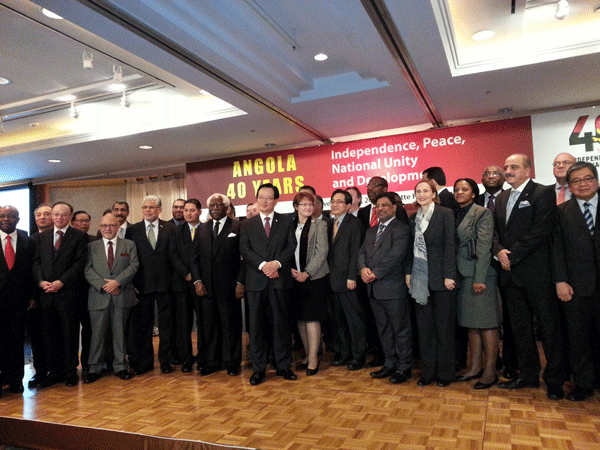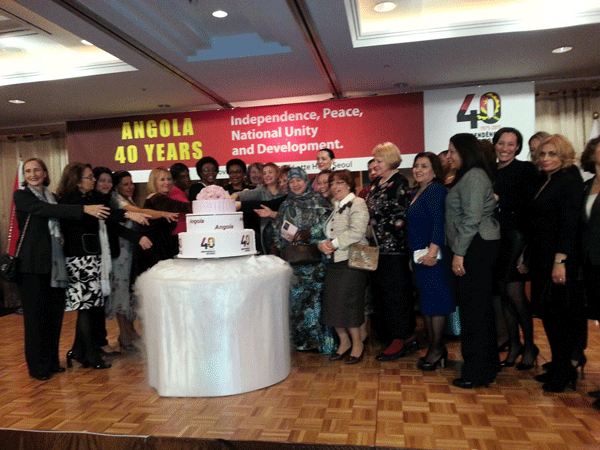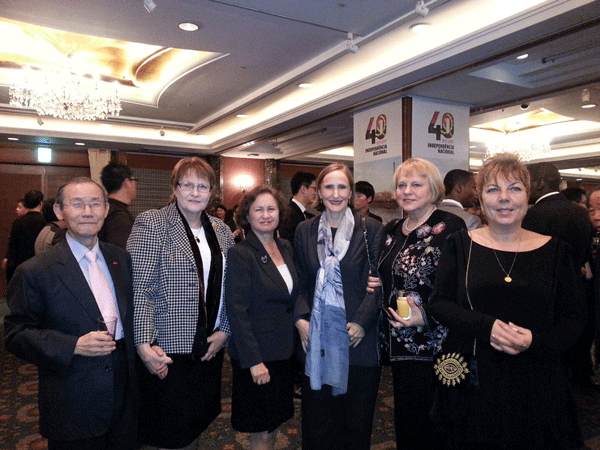On the occasion of the 40th Anniversary of the Independence of the Republic of Angola on Nov. 11, 2015, Ambassador and Mrs. Albino Malungo hosted a reception at Lotte Hotel in Seoul to celebrate the auspicious occasion.
The reception was attended by Speaker Chung Eui-Hwa of the National Assembly, Deputy Minister Shin Dong-ik for Multilateral and Global Affairs at the Ministry of Foreign Affairs and many other important guests from the Korean society and the international community.

Among the foreign dignitaries in attendance were Ambassadors Mohammed Chraibi of Morocco, Hassan Taherian of Iran, Hernan BrantesGlavic of Chile, Mumba Smyth Kapumpa of Zambia, HakanOkcal of Turkey, Oscar Gustavo Herrera Gilbert of Ecuador, Albino Malungo of Angola, Mohamed Salim Alharthy of Oman, Elisabeth Bertagnoli of Austria, RamziTeymurov of Azerbaijan, Hassan Taherian of Iran, Mohamed Ali Nafti of Tunisia and KhamsouayKeodalavong of the Lao Republic.
Speaking to the guests, Ambassador Malungo said, “The independence of Angola was proclaimed on November 11th1975, the height of the Cold War which led to the flee or abandonment of the colonial authorities, the division of Angolans, and launched them into a violent civil war that caused the destruction of the already limited infrastructures and economic and social structure, forced movement and the death of millions of citizens.” Excerpts from the speech follow:

We celebrate 40 years of existence, preceded by a brutal colonization of about 500 years of anti-colonial wars and attempts to preserve our cultural identity.
The independence of Angola was proclaimed on November 11th1975, the height of the Cold War which led to the flee or abandonment of the colonial authorities, the division of Angolans and launched them into a violent civil war that caused the destruction of the already limited infrastructures and economic and social structure, forced movement and the death of millions of citizens.
Mr. Speaker, as your knowledge, Angola achieved definitive peace in April 2002. National unity, peace, democracy and stability are certainly the biggest reasons for satisfaction in today's celebrations. We managed to consolidate democracy and maintain irreversibly unity in diversity. The state is definitely committed to building a more equitable society based on sustainable and inclusive development, as recommended by the agenda of the United Nations for 2030.
During the 13 years of peace, the Government of Angola had an outstanding performance in the implementation of reconstruction and national reconciliation program, consolidation of democratic achievements, macroeconomic stabilization and creation of infrastructure for the development of the country. Angola has entered the phase of modernization and sustainable development, centered on stability, growth, and appreciation of Angolans prominently in technical and vocational training and higher education.
In recent months, the country's development plans have been affected by a decline in government revenue due to the sharp drop in oil prices, which forced us to take a series of measures in the economic, social and administrative level to maintain stability and normal functioning of institutions.
We continue however to successfully implement projects that favors the development of the country and its people, such as water supply and sanitation, expansion of production capacity and power systems, logistics platforms, recovery and conservation of the road network, hospitals and education infrastructures. Rural development projects, fighting poverty, increasing primary health care and water for all have absolute priority even under current conditions.

Speaker of the National Assembly,
Distinguished Guests,
As I mentioned earlier, the Angolan economy has been greatly affected given its dependence on oil. It would however be noted that while in 2002, the year of Peace and in 2008 oil production accounted for respectively 46% and 58% of GDP in 2014 accounted for only 35%. Between 2008 and 2014, it doubled the growth rate of non-oil product.
It is true that we still have many weaknesses or difficulties which are common in a state with only 40 years of existence, with 27 years of violent civil war and only 13 years of peace, after nearly five centuries of colonization.
We are determined to end poverty and all its forms and dimensions throughout the country and increasingly dignify our citizenship; we are also determined to make our contribution to World Peace and so we bet on friendship and close cooperation with the Republic of Korea, the country which history we know and admire.
We rely on the experience of South Korea on the enormous task of developing our country. Your story and your example as a nation are inspiring to all Angolans. We will hold briefly in Luanda the Korea-Angola Bilateral Joint Committee that hopes come strengthened our ties of cooperation and friendship.
Angola welcomes all initiatives of South Korean government, towards peace and reunification of the Korean Peninsula. In Africa, SADC, UN Security Council, where we now have a non-permanent member seat, the Republic of Korea have our support and solidarity.
Mr. Speaker,
We have followed with great satisfaction, your personal commitment and the dedication of Members of the National Assembly under your leadership in strengthening friendship and cooperation between the Republic of Korea and Africa. We feel indeed your country ever closer.

